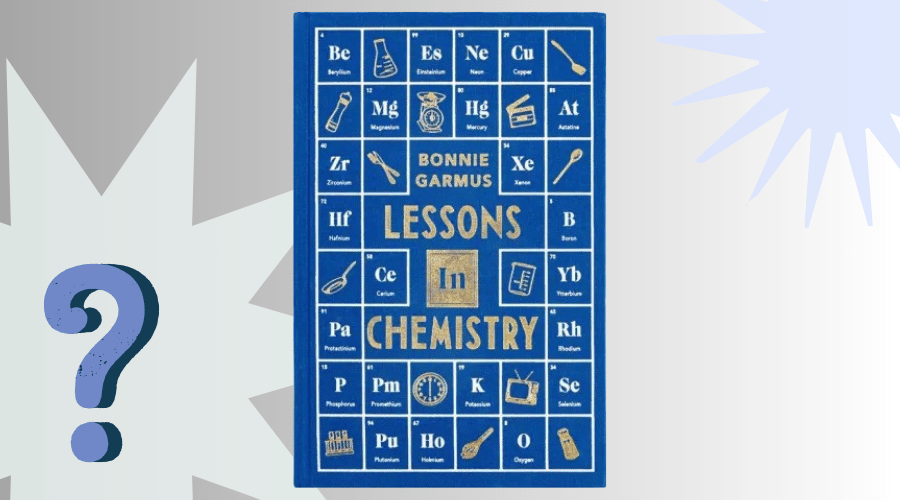Lessons in Chemistry is a fantastic choice for a book club! It’s filled with thought-provoking themes like feminism, societal expectations, and the struggle for equality, which naturally spark great discussions. Elizabeth Zott’s journey as a chemist facing constant challenges in a male-dominated field touches on topics still relevant today, like workplace discrimination and breaking traditional gender roles. Plus, it’s layered with humor, romance, and emotional moments that keep it engaging.
The characters are also unique and memorable, from the fiercely independent Elizabeth to her clever dog Six-Thirty. Each one brings a different perspective, which would make for some fun debates in a book club setting. Overall, it’s an accessible, inspiring read that mixes real issues with humor, making it perfect for a group discussion.
20 Lessons in Chemistry Book Club Questions
Here are 20 book club questions for Lessons in Chemistry to spark discussion:
- Elizabeth Zott is a unique and strong protagonist. What are some of her most defining traits, and how do they affect her journey?
- How does Elizabeth’s experience in the male-dominated field of chemistry reflect the challenges women faced in the 1960s? Are any of these challenges still relevant today?
- What role does Calvin Evans play in Elizabeth’s life? How does his influence continue after his death?
- Elizabeth turns a cooking show into a platform for empowerment. What are some ways she uses Supper at Six to challenge societal norms?
- How does Elizabeth’s relationship with her daughter, Madeline, evolve throughout the novel? What impact does Elizabeth’s parenting style have on Mad?
- Six-Thirty, Elizabeth’s dog, is a beloved character in the book. What does he symbolize, and how does his presence add depth to the story?
- Elizabeth’s scientific approach to cooking was revolutionary for her time. How does this reflect her character and her views on education?
- The novel uses humor to address serious themes. Did this balance work for you? How did it affect your reading experience?
- How do secondary characters like Harriet Sloane and Walter Pine influence Elizabeth’s journey? Who stands out to you the most, and why?
- What does the title Lessons in Chemistry signify? How does it relate to both Elizabeth’s career and her personal life?
- How does Elizabeth’s struggle for recognition as a scientist reflect the experiences of other women in her field during that era?
- How did the book’s portrayal of sexism and discrimination make you feel? Were there any specific moments that were particularly impactful?
- Calvin’s past and upbringing are significant in the story. How did his backstory affect your perception of him?
- Elizabeth is often described as “unconventional.” How do you think her story would be different if she conformed to society’s expectations?
- What did you think of Miss Frask’s character development, especially after learning about her connection to Calvin?
- How does Lessons in Chemistry handle themes of motherhood? How do Elizabeth’s experiences as a mother shape her decisions?
- The 1960s setting is pivotal to the story. How do you think Elizabeth’s experiences would differ in a modern context?
- Were there any parts of the book that you found surprising or unexpected? How did these moments affect your perception of the story?
- What message do you think Lessons in Chemistry ultimately conveys about resilience and empowerment?
- Would you recommend this book to others? What makes it a valuable or worthwhile read for a book club?
These questions should lead to some deep and engaging discussions about the book’s themes, characters, and historical context!
📚 Explore more: Lessons in Chemistry Summary, Characters and Plot Analysis
Lessons in Chemistry: Discussion topics
Along with the book club questions, here are some additional discussion ideas to dive deeper into Lessons in Chemistry:
- Historical Context: Discuss the impact of the 1960s setting. How do societal expectations of that era shape the characters’ experiences? Are there specific historical events or cultural norms referenced in the story that surprised or resonated with you?
- Themes of Feminism and Gender Roles: Explore how feminism is portrayed in the novel. Elizabeth’s fight against traditional gender roles and workplace sexism can bring up conversations on how these dynamics have or haven’t changed since the 1960s.
- Science and Education as Empowerment: Elizabeth teaches science through cooking on her show Supper at Six, blending education with empowerment. Discuss how knowledge and education can be tools for liberation and change, both in the story and in real life.
- Media Influence and Public Perception: The success of Elizabeth’s cooking show highlights the power of media to shape opinions and provide a platform for change. Talk about how media, both then and now, can be used to challenge norms or reinforce them.
- Motherhood and Single Parenting: Elizabeth’s experience as a single mother is central to her story. Consider how she balances her ambitions with the responsibilities of parenting, and discuss the portrayal of single motherhood in the book.
- Character Dynamics and Relationships: Look at the variety of relationships Elizabeth has—romantic, platonic, and professional. How does each relationship contribute to her personal growth or reinforce the novel’s themes?
- Symbolism and Metaphors: There are several symbolic elements, such as Six-Thirty the dog, who represents loyalty and unconditional support, or the chemistry theme that runs throughout. Discuss any symbols or metaphors that stood out to you.
- Author’s Writing Style and Tone: Bonnie Garmus combines humor with serious themes, creating a unique narrative voice. How does her writing style affect your reading experience? Does the humor help make the tough issues more accessible?
- Comparing to Real-Life Stories of Women in STEM: Many real women in science faced (and still face) challenges similar to Elizabeth’s. Compare the fictionalized struggles with real stories of women in STEM.
- Impact of Calvin’s Death on the Story: Calvin’s death is a major turning point. How does this event shift Elizabeth’s trajectory? Would her story have been different if he had lived?
- Lessons Learned: Talk about any personal takeaways from Elizabeth’s journey and struggles. Did the book change your perspective on anything related to gender, work, or personal resilience?
These topics should add depth to your discussion and bring out different perspectives within your group!
How to make Your Lessons in Chemistry Book Club more Interactive?
To make your book club discussion on Lessons in Chemistry even more engaging, you could add some interactive and thematic elements to the meeting. Here are some fun and creative ideas:
- Quote Sharing: Ask each person to bring their favorite quote or passage from the book and explain why it stood out to them. This is a fun way to see which moments resonated most with different readers and can spark deeper discussions.
- Character Role-Play: If your group is up for it, try a lighthearted role-play. Each member could pick a character (Elizabeth, Calvin, Harriet, Six-Thirty, etc.) and share how they feel about a certain theme or scene from the character’s perspective.
- Science Trivia: Set up a fun trivia game about chemistry or science in general to honor Elizabeth’s passion. You can throw in questions related to the book, famous women in STEM, or basic science facts. Winners get small prizes!
- Watch or Read about Women in STEM Today: If time allows, you could watch a short video or TED Talk about women in STEM today. Discussing how far we’ve come (and how far we still have to go) would add relevance and make the book’s themes hit home even more.
Adding these interactive touches will make the book club experience memorable and bring Elizabeth Zott’s world to life for your group. Enjoy the meeting—it sounds like it’ll be a blast!
📚 Explore more: None of This Is True Book Club Questions for Discussion

